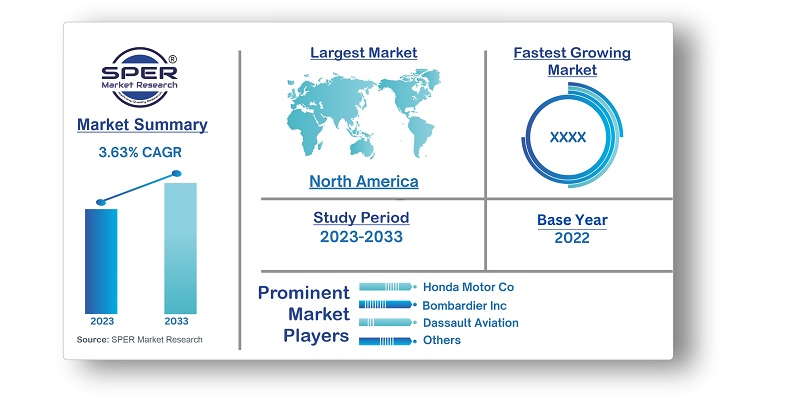
North America Business Jet Market Growth, Size, Trends, Demand, Revenue and Future Outlook
North America Business Jet Market Size- By Business Jet Type, By System- Regional Outlook, Competitive Strategies and Segment Forecast to 2033
| Published: Jan-2024 | Report ID: AERO2404 | Pages: 1 - 160 | Formats*: |
| Category : Aerospace and Defence | |||
- April 2022: A sales agreement for a maximum of thirty Cessna Citation CJ3+ aircraft has been inked by Exclusive Jets LLC and TEXTRON AVIATION.
- February 2022: The Gulfstream G600, the company's first aircraft, was ordered by private-charter owner/operator Thrive Aviation in February 2022. It is anticipated that the aircraft will be delivered in the 2022 summer.


| Report Metric | Details |
| Market size available for years | 2019-2033 |
| Base year considered | 2022 |
| Forecast period | 2023-2033 |
| Segments covered | By Business Jet Type, By System |
| Regions covered | Eastern Region, Western Region, Southern Region, Northern Region |
| Companies Covered | Honda Motor Co., Ltd., Bombardier Inc., Cirrus Design Corporation, Dassault Aviation, Embraer, General Dynamics Corporation, Pilatus Aircraft Ltd, Textron Inc. |
- Aerospace Manufacturers
- Aircraft Component Suppliers
- Aviation Investors
- Business Jet Operators
- Aviation Associations and Organizations
| By Business Jet Type: |
|
| By System: |
|
| By Region: |
|
- North America Business Jet Market Size (FY’2023-FY’2033)
- Overview of North America Business Jet Market
- Segmentation of North America Business Jet Market By Business Jet Type (Light Business Jet, Mid-Sized Business Jet, Large Business Jet)
- Segmentation of North America Business Jet Market By System (Propulsion System, Aero Structure, Avionics, Others)
- Expansion Analysis of North America Business Jet Market
- Problems and Obstacles in North America Business Jet Market
- Competitive Landscape in the North America Business Jet Market
- Impact of COVID-19 and Demonetization on North America Business Jet Market
- Details on Current Investment in North America Business Jet Market
- Competitive Analysis of North America Business Jet Market
- Prominent Players in the North America Business Jet Market
- SWOT Analysis of North America Business Jet Market
- North America Business Jet Market Future Outlook and Projections (FY’2023-FY’2033)
- Recommendations from Analyst
1.1. Scope of the report1.2. Market segment analysis
2.1. Research data source2.1.1. Secondary Data2.1.2. Primary Data2.1.3. SPER’s internal database2.1.4. Premium insight from KOL’s2.2. Market size estimation2.2.1. Top-down and Bottom-up approach
2.3. Data triangulation
4.1. Driver, Restraint, Opportunity and Challenges analysis4.1.1. Drivers4.1.2. Restraints4.1.3. Opportunities4.1.4. Challenges4.2. COVID-19 Impacts of the North America Business Jet Market
5.1. SWOT Analysis5.1.1. Strengths5.1.2. Weaknesses5.1.3. Opportunities5.1.4. Threats5.2. PESTEL Analysis5.2.1. Political Landscape5.2.2. Economic Landscape5.2.3. Social Landscape5.2.4. Technological Landscape5.2.5. Environmental Landscape5.2.6. Legal Landscape5.3. PORTER’s Five Forces5.3.1. Bargaining power of suppliers5.3.2. Bargaining power of buyers5.3.3. Threat of Substitute5.3.4. Threat of new entrant5.3.5. Competitive rivalry5.4. Heat Map Analysis
6.1. North America Business Jet Market Manufacturing Base Distribution, Sales Area, Product Type6.2. Mergers & Acquisitions, Partnerships, Product Launch, and Collaboration in North America Business Jet Market
7.1. North America Business Jet Market Value Share and Forecast, By Business Jet Type, 2023-20337.2. Light Business Jet7.3. Mid-Sized Business Jet7.4. Large Business Jet
8.1. North America Business Jet Market Value Share and Forecast, By System, 2023-20338.2. Propulsion System8.3. Aero Structure8.4. Avionics8.5. Others
9.1. North America Business Jet Market Size and Market Share
10.1. North America Business Jet Market Size and Market Share By Business Jet Type (2019-2026)10.2. North America Business Jet Market Size and Market Share By Business Jet Type (2027-2033)
11.1. North America Business Jet Market Size and Market Share By System (2019-2026)11.2. North America Business Jet Market Size and Market Share By System (2027-2033)
12.1. North America Business Jet Market Size and Market Share By Region (2019-2026)12.2. North America Business Jet Market Size and Market Share By Region (2027-2033)12.3. Canada12.4. Mexico12.5. United States12.6. Rest of North America
13.1. Honda Motor Co., Ltd.13.1.1. Company details13.1.2. Financial outlook13.1.3. Product summary13.1.4. Recent developments13.2. Bombardier Inc.13.2.1. Company details13.2.2. Financial outlook13.2.3. Product summary13.2.4. Recent developments13.3. Cirrus Design Corporation13.3.1. Company details13.3.2. Financial outlook13.3.3. Product summary13.3.4. Recent developments13.4. Dassault Aviation13.4.1. Company details13.4.2. Financial outlook13.4.3. Product summary13.4.4. Recent developments13.5. Embraer13.5.1. Company details13.5.2. Financial outlook13.5.3. Product summary13.5.4. Recent developments13.6. General Dynamics Corporation13.6.1. Company details13.6.2. Financial outlook13.6.3. Product summary13.6.4. Recent developments13.7. Pilatus Aircraft Ltd13.7.1. Company details13.7.2. Financial outlook13.7.3. Product summary13.7.4. Recent developments13.8. Textron Inc.13.8.1. Company details13.8.2. Financial outlook13.8.3. Product summary13.8.4. Recent developments
SPER Market Research’s methodology uses great emphasis on primary research to ensure that the market intelligence insights are up to date, reliable and accurate. Primary interviews are done with players involved in each phase of a supply chain to analyze the market forecasting. The secondary research method is used to help you fully understand how the future markets and the spending patterns look likes.
The report is based on in-depth qualitative and quantitative analysis of the Product Market. The quantitative analysis involves the application of various projection and sampling techniques. The qualitative analysis involves primary interviews, surveys, and vendor briefings. The data gathered as a result of these processes are validated through experts opinion. Our research methodology entails an ideal mixture of primary and secondary initiatives.



Frequently Asked Questions About This Report
PLACE AN ORDER
Year End Discount
Sample Report
Pre-Purchase Inquiry
NEED CUSTOMIZATION?
Request CustomizationCALL OR EMAIL US
100% Secure Payment






Related Reports
Our Global Clients
Our data-driven insights have influenced the strategy of 200+ reputed companies across the globe.




















